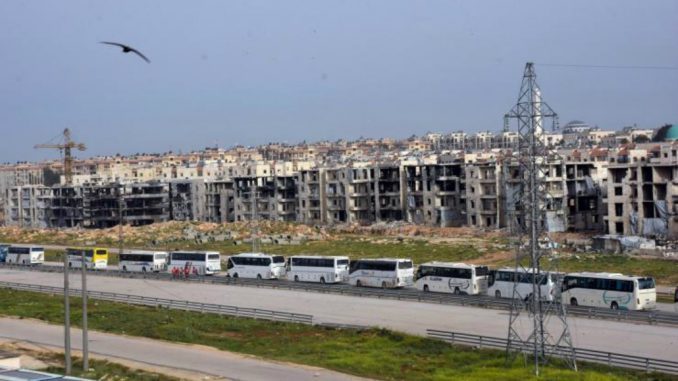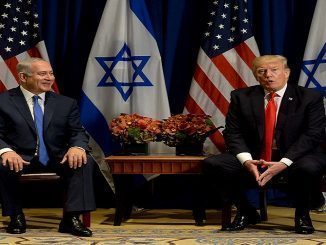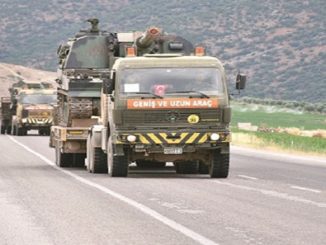
A Qatari group of 26 hunters kidnapped in southern Iraq in 2015 has been freed and was being handed over to a delegation from Doha in Baghdad on Friday as part of the four-towns evacuation deal in Syria.
After long months of siege, bombing, and starvation the rebels were forced to sign a new deal with the Assad regime, which includes lifting the siege on two towns in rural Damascus in exchange for evacuating their citizens to northern Syria and allowing two rebel-besieged towns to be evacuated too.
A senior Arab diplomat in Qatar involved in the talks said that Iranian officials and Ahrar al-Sham held discussions about the four-towns swap in Qatar when Iran’s foreign minister visited Doha in March.
Those discussions also involved the freeing of 26 Qatari hostages held by unidentified gunmen in Iraq, he said.
“The interior ministry has received the Qatari hunters, all 26 of them,” the minister’s adviser, Wahab al-Taee, told AFP news agency.
The men were handed over to a Qatari delegation and left for Doha, a ministry spokesman said in a statement. An airport official told The Associated Press the group departed on Friday afternoon on a private Qatari jet from Baghdad airport.
The group of hunters, believed to include one or several prominent members of the Qatari royal family, were kidnapped in mid-December 2015 during a hunting trip in the Muthanna governorate of southern Iraq.
They were taken from a desert camp for falcon hunters in southern Iraq in Muthanna province, some 370km southeast of the Iraqi capital.
Little information had surfaced since their abduction as to their whereabouts or condition. In April 2016, the Qatari Foreign Ministry said one of the hunters and an Asian worker on the trip had been freed.
Terms of the deal
Al-Taee would not provide details of the terms of their release but a source close to the negotiations told AFP on condition of anonymity that it was part of a broad regional deal.
In addition, the Guardian revealed last week that the deal has involved large ransom demands and payments, secret summits in the Qatari capital, Doha, in addition to the deal that aims to re-engineer Syria’s demography to suit the interests of Iran and its proxies.
The royals were received in Baghdad before being returned to Doha, where the latest phase of the deal had been finalized. Although the men had been missing for almost a year, their return was not tied to negotiations in Syria until last November, after which talks that had previously stalled in Istanbul between Ahrar al-Sham and Iran gained new impetus.
“The Qataris are now in [Prime Minister] Haider al-Abadi’s office following a deal between Jabhat al-Nusra and the kidnappers,” the source said, referring to the former al-Qaeda affiliate now known as Jabhat Fateh al-Sham.
There was never any claim of responsibility for the kidnapping of the hunters, who were seized in a Shia area of Iraq and widely believed to have been nabbed by militias with close ties to Iran.
None of the stakeholders would discuss ransom payments, or publicly admit that money had changed hands for the deal to go ahead. However, Hezbollah is known to have put a price on the return of its captives, and both Syrian militias had agreed to facilitate the exodus from Foua and Kefraya after discussions with Qatari brokers.
Officials in Baghdad said a Qatari plane that arrived in Baghdad on Saturday was carrying large bags that Qatari government officials refused to allow to be searched. Iraqi officials said they believed that the bags had contained cash that was used to finalize the release.
Hoshyar Zebari, Iraq’s former finance minister, wrote on Twitter shortly after the hostages were released that the deal – brokered by Qatar and Iran – violated Iraq’s sovereignty.
Release of Qatari hunters in Iraq after 16 months in captivity by a pro Iranian & Hizbulah Shia armed group is a travesty of sovereign Iraq.
— Hoshyar Zebari (@HoshyarZebari) April 21, 2017
The first phase of four-towns deal is finished
The deal was stopped on Saturday, 15 March, after a bomb attack targeted evacuated from the two Shiite villages near Aleppo, leaving more than 126 killed most of them are women and children.
The evacuation process was resumed on Wednesday after a few days halt due to the terror attack but was stopped again for another 48-hours.
With the transfer completed on Friday, the first phase of the population swap deal in Syria comes to an end.
A total of 8,000 residents from the pro-government villages of Foua and Kefraya – besieged for two years amid Syria’s bloody civil war by anti-government rebels – and nearly 3,000 evacuees from the rebel-held Zabadani, Madaya and surrounding areas have left their homes.
Under the deal, an estimated 30,000 people will be transferred from their hometowns over 60 days, most of them from the pro-government villages in northern Idlib.
It is one Syria’s largest population transfers, which the opposition has described as “demographic engineering”, and the first to involve a reciprocal population swap.
Assad regime’s media arm said 46 buses carrying residents of Foua and Kefraya arrived in Jibreen, an Aleppo suburb, on Friday. Some 15 buses were carrying residents and rebels from the Zabadani area, which was besieged by the government, departed for Idlib.
Asad regime forces declared that armed groups no longer have any presence in the Zabadani and Madaya areas, which government troops entered after the evacuation. The Syrian military said it had destroyed a tunnel linking the two areas.
U.N. Syria humanitarian adviser Jan Egeland said there had been more evacuation deals this year than before, but that they appeared driven more by military priorities than humanitarian concerns.
“They seem to follow a military logic, they do not seem to put the civilians at the heart of the agreement,” he told reporters in Geneva on Thursday.
The United Nations was not involved in the evacuation of the four towns. Egeland said that it was misleading to consider them voluntary evacuations when the towns had been besieged for years.
“Besiegement should end by being lifted,” he said, “not by places being emptied from people.”
The Syrian crisis began as a peaceful demonstration against the injustice in Syria. Assad regime used to fire power and violence against the civilians and led to armed resistance. 450.000 Syrians lost their lives in the past five years according to UN estimates, and more than 12 million have lost their homes.



